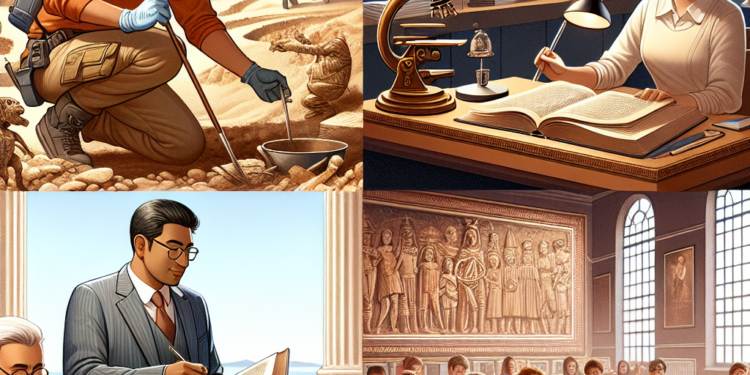A history degree is more than just learning about dates and events; it serves as a gateway to developing a wide range of valuable skills. It equips students with critical skills such as analytical thinking, research proficiency, and effective communication. These competencies are not confined to the study of history; they are highly transferable and sought after in various fields, from business to public policy. Furthermore, the ability to understand complex historical contexts and draw connections between past and present is a skill that can enhance decision-making and strategic planning in many careers. Let’s delve into some of the top jobs to get with a history degree, highlighting how these skills are applied in real-world settings.
Education and Academia

Teaching
One of the most direct career paths for history graduates is teaching. Whether at the high school or university level, educators play a vital role in shaping future generations’ understanding of history. High school teachers have the opportunity to inspire young minds, fostering a love for history and critical thinking skills. To teach in public schools, you’ll typically need a teaching certificate in addition to your degree. For those aspiring to teach at the university level, a graduate degree is often required, along with a strong commitment to research and academic writing. Additionally, teaching offers the chance to continually learn and explore new historical topics, making it a dynamic and intellectually rewarding career.
Academic Researcher
Academic researchers focus on deepening the understanding of history by exploring specific topics in detail. They may work for universities, think tanks, or research institutions, contributing to academic publications or public knowledge. This career path requires a passion for discovery and the ability to conduct thorough, unbiased investigations. Researchers often collaborate with other scholars, presenting their findings at conferences and in journals, which can influence educational curricula and public policy. The role of an academic researcher is vital in preserving historical knowledge and ensuring that new generations have access to accurate and comprehensive historical records.
Museums and Archives
Museum Curator
Museum curators manage collections of artifacts and artworks, organizing exhibitions and educational programs. They need a keen eye for detail and an ability to engage the public with historical narratives. Curators play a critical role in preserving cultural heritage, ensuring that museum visitors have access to rich, informative displays that bring history to life. This role often involves collaborating with historians, artists, and educators to create immersive experiences. In addition to a history degree, curators often benefit from knowledge in art history, museum studies, or cultural heritage management, which can further enhance their ability to curate impactful exhibits.
Archivist
Archivists are responsible for preserving important documents and records. They work in museums, libraries, and government agencies, ensuring that future generations have access to historical information. A history degree provides a solid foundation for understanding the context and significance of archived materials. In this role, attention to detail is crucial, as archivists must meticulously catalog and preserve items for long-term storage. Beyond preservation, archivists may also engage in digitization projects, making historical documents accessible to a global audience and contributing to the democratization of information.
Government and Public Service

Historian
Government agencies and historical societies often employ historians to conduct research, analyze historical data, and provide insights that can shape policy decisions. This role requires strong analytical skills and the ability to communicate findings effectively. Historians in public service may work on projects related to national heritage, public education, or cultural preservation. They might also be involved in drafting reports or proposals that influence legislative processes. By providing historical perspectives, historians can help governments understand the implications of past decisions and avoid repeating mistakes, playing a crucial role in informed policy-making.
Cultural Resource Manager
Cultural resource managers work to preserve and protect cultural heritage sites. They assess the historical significance of sites and develop plans to ensure their conservation. This role often involves working with government agencies, non-profit organizations, and private companies. Cultural resource managers must balance development with preservation, ensuring that economic growth does not come at the expense of historical integrity. They often collaborate with archaeologists, architects, and community leaders to implement conservation strategies that respect cultural significance while accommodating modern needs History Degree Jobs.
Media and Communications
Journalist
History graduates can leverage their research and writing skills in journalism. Covering historical events, cultural stories, or investigative reporting are areas where history majors can excel. Strong storytelling abilities and a curiosity about the past are essential traits for success in this field. Journalists with a history background are particularly adept at providing context and depth to current events, offering audiences a richer understanding of the news. They may work for newspapers, magazines, or digital media platforms, where their ability to craft compelling narratives can engage and inform a broad audience.
Content Writer or Editor
History Degree Jobs. Content creation is another avenue for history graduates. Whether writing for websites, magazines, or publishing companies, the ability to craft compelling narratives and present factual information is invaluable. History majors are well-equipped to produce engaging and informative content, drawing on their research skills to create accurate and impactful stories. As editors, they can ensure the quality and integrity of content, guiding writers to produce work that resonates with readers. This role often involves collaboration with designers and marketers to align content with organizational goals and audience interests.
Law and Business

Legal Assistant
A history degree can be an excellent stepping stone into the legal field. Legal assistants support lawyers by conducting research, organizing documents, and preparing case files. Understanding historical context and possessing strong research skills are advantageous in this role. Legal assistants often work on cases that require an understanding of precedents and legislative history, making history graduates well-suited to the task. Furthermore, the analytical skills honed during a history degree are invaluable when interpreting legal documents and constructing coherent arguments.
Business Analyst
Business analysts use data to help companies make informed decisions History Degree Jobs. History graduates with strong analytical skills can excel in this role, as they are adept at identifying patterns and drawing conclusions from complex information. This position involves gathering and analyzing data to identify trends, evaluate business processes, and recommend improvements. History majors can bring a unique perspective to business analysis, applying their understanding of historical trends and human behavior to predict market shifts and inform strategic planning.
Non-Profit and Advocacy
Non-Profit Program Coordinator
History Degree Jobs. Working for a non-profit organization allows history majors to apply their skills in advocacy and program management. Coordinators develop and implement programs that align with the organization’s mission, often focusing on education, culture, or community engagement. This role requires strong organizational and communication skills, as well as the ability to work collaboratively with diverse stakeholders. History graduates can leverage their understanding of social issues and historical contexts to create impactful programs that address community needs and promote social change.
Policy Analyst
Policy analysts research and evaluate the effects of public policies, helping to shape governmental or organizational decisions. History majors can use their analytical skills to assess policy impacts and recommend changes, making a meaningful difference in society. This role involves conducting comprehensive research, analyzing data, and presenting findings to policymakers or organizational leaders. Policy analysts often work in think tanks, government agencies, or advocacy groups, where they can influence policy development and contribute to more equitable and effective governance.
Conclusion
A history degree opens doors to a wide range of career paths. From education and museums to media and law, history graduates have the skills needed to succeed in various fields. By leveraging your analytical thinking, research skills, and ability to communicate effectively, you can find fulfilling and meaningful work that aligns with your interests and strengths. Whether you choose to teach, work in public service, or explore opportunities in media and business, your history degree is a valuable asset that will serve you well throughout your career. Embrace the diverse opportunities available to you, and remember that your understanding of the past can be a powerful tool in shaping the future.




